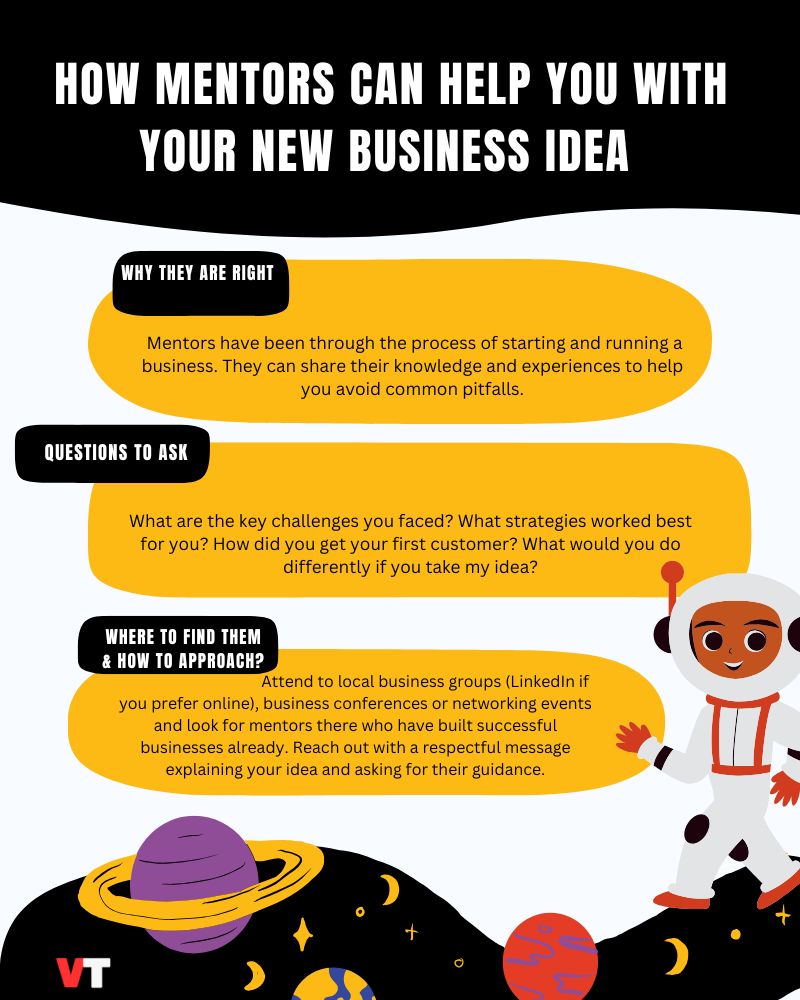To turn your business idea into reality, you need to talk to the right people who can guide and support you. The best people to talk to are mentors, business advisors, investors, entrepreneurs, industry experts, local business organizations, Small Business Administration (SBA), incubators, and accelerators. They can provide guidance, feedback, and resources to help you plan and execute your business idea.
A lot of people will suggest you to talk with your family members first, but that is such a bad idea! If your family members are not in business at any way, you will never get good suggestions about what to do next. Period. I myself could start my entrepreneurial journey when I was in class 11 but I couldn’t due to the lack of business knowledge of my family members.
Let’s talk about who to go with your new unpolished business idea to. Keep reading…
Top People/institutions and Groups to Talk To

1. Mentors: Experienced individuals who provide guidance and advice.
- Why They Are Right: Mentors have been through the process of starting and running a business. They can share their knowledge and experiences to help you avoid common pitfalls.
- Where to Find Them & how to approach: Attend to local business groups (LinkedIn if you prefer online), business conferences or networking events and look for mentors there who have built successful businesses already. Reach out with a respectful message explaining your idea and asking for their guidance.
- Questions to Ask: What are the key challenges you faced? What strategies worked best for you? How did you get your first customer? What would you do differently if you take my idea?
2. Business Advisors: Professionals who offer expert advice on business operations.
- Why They Are Right: Business advisors have specialized knowledge in areas like finance, marketing, and operations. They can help you create a solid business plan.
- How to Approach: Look for advisors through business networks or referrals. Schedule a meeting to discuss your idea and seek their input.
- Questions to Ask: Can you help me review my business plan? What are some potential risks and how can I mitigate them?
Investors: People or companies that provide funding in exchange for equity.
- Why They Are Right: Investors can provide the financial resources needed to start and grow your business.
- How to Approach: Pitch your idea through presentations or business proposals. Attend investor meetups or pitch events.
- Questions to Ask: What do you look for in a startup? What kind of return on investment do you expect?
Entrepreneurs: People who have successfully started their own businesses.
- Why They Are Right: Entrepreneurs have first-hand experience in building a business from the ground up. They can provide practical advice and inspiration.
- How to Approach: Attend entrepreneurship meetups or online forums. Connect with them on social media platforms like LinkedIn.
- Questions to Ask: What were your biggest challenges? How did you overcome them?
Industry Experts: Specialists with deep knowledge of a particular field.
- Why They Are Right: Industry experts can offer insights into market trends, customer preferences, and technical aspects relevant to your business.
- How to Approach: Connect through industry conferences or professional groups. Send a well-crafted email or LinkedIn message.
- Questions to Ask: What are the latest trends in the industry? How can I position my business to take advantage of these trends?
Local Business Organizations: Groups that support local businesses.
- Why They Are Right: Local business organizations can provide networking opportunities and resources tailored to your community.
- How to Approach: Join local business chambers or associations. Attend their events and participate in their programs.
- Questions to Ask: What resources are available for new businesses? How can I get involved in the local business community?
Small Business Administration (SBA): Government agency providing resources and support.
- Why They Are Right: The SBA offers a wide range of resources, including loan programs, training workshops, and business counseling.
- How to Approach: Visit SBA offices or their website. Schedule a meeting with an SBA advisor.
- Questions to Ask: What loan programs are available for my type of business? Can you help me with my business plan?
Incubators: Programs that help startups grow by providing resources and mentorship.
- Why They Are Right: Incubators offer a supportive environment for startups, including office space, mentorship, and networking opportunities.
- How to Approach: Apply to incubator programs. Prepare a strong application that highlights your business idea and its potential.
- Questions to Ask: What resources do you provide to startups? How can your program help my business grow?
Accelerators: Organizations that provide intensive guidance and funding to startups.
- Why They Are Right: Accelerators can fast-track your business growth with funding, mentorship, and access to a network of investors.
- How to Approach: Apply to accelerator programs. Be prepared to present your business idea and growth plan.
- Questions to Ask: What are the key milestones in your program? How can I maximize the benefits of being in an accelerator?
Online Business Communities: Forums and platforms where entrepreneurs share ideas.
- Why They Are Right: Online communities offer a platform to get feedback, share experiences, and connect with like-minded individuals.
- How to Approach: Join online platforms like Reddit or industry-specific forums. Participate actively and ask for feedback on your idea.
- Questions to Ask: What do you think of my business idea? What improvements can I make?
Things To Make Crystal Clear Before Talking To An Experienced Group/People/Institutions
When you are going to talk to another business person, you will need to answer a lot of questions about your current state, current thinking and existing plan. So, it is wise to get them ready before talking to anyone. At least, this readiness will stand you as a solid man who really cares about the dream and everyone will understand that you are a serious guy, and you should get all the support the world has.
Here you go:
- Problems to Solve: Clearly define the problem your business will solve. Do you have a written list of problems that your product/service/business will clearly solve? If yes, you are good to go.
- Target Market: Identify who your customers will be. This includes demographics, location, and buying behavior. Do you have clear audience persona created?
- Initial Investment Scopes: Know how much money you need to start your business. This includes initial setup costs, operating expenses, and any other financial needs. Do you have financial backup for at least 6 months?
- Unique Selling Proposition (USP): Understand what makes your business unique. This could be a unique feature, a better price, or superior customer service. Ask yourself – what is the main thing that is different from the other competitors available on the market?
- Business Model: Plan how your business will make money. This includes pricing strategies, sales channels, and revenue streams. Have you written a list of channels you are going to dominate?
- Other Important Things: Consider aspects like your business name, legal structure, and any necessary permits or licenses. Have you started processing the licensing thing for your business? If so, in which state it is in?
Once you start talking with other successful people (in business or entrepreneurship), you will get a lot of ideas, plans and suggestions. So what’s next?
You should design your business again following all the suggestions you got from the experts. By following the suggestions, reshuffle and redesign your business plan and start making a prototype to test the market. In fact, if needed, study the market and competitors again, make a detailed business plan again and test your product and launch. Evaluate how everything is going on and what’s going wrong and adjust your plan accordingly.
Business Tools To Help You Turn Your Idea Into Reality
Here are some popular tools that can help you turn your business idea into reality. These tools will surely fasten the process for you to get your ideas going forward.
Planning Tools
- BPlans – Business Plan Pro: Complete planning software
- LivePlan: Online planning tool
- Canva: Design marketing materials
- Google Workspace: Document creation and sharing
Financial Tools
- QuickBooks: Accounting and invoicing
- Stripe: Payment processing
- FreshBooks: Invoice and expense tracking
- Wave: Free accounting for small business
Marketing Tools
- Mailchimp: Email marketing
- Hootsuite: Social media management
- Google Analytics: Website tracking
Customer Service Tools
- Zendesk: Customer support
- Hubspot: Customer relationship management
- SurveyMonkey: Customer feedback
- Calendly: Appointment scheduling
So, that’s it.
Talking with experts, evaluating your existing ideas with suggested stuff and going for implementing all the things with the right tools is your first step.
Good luck.



